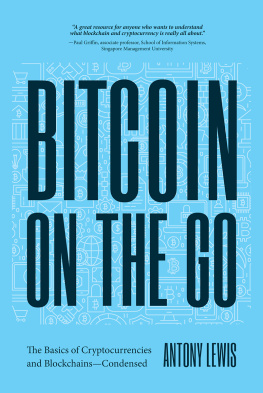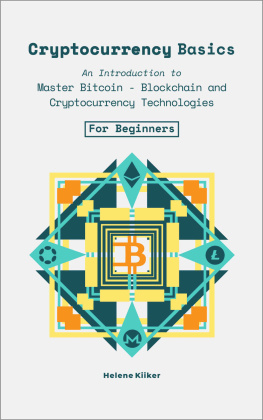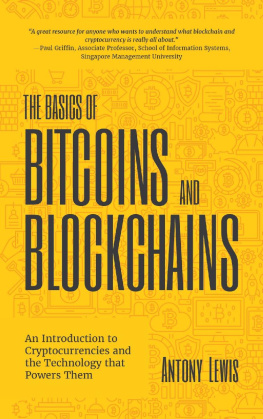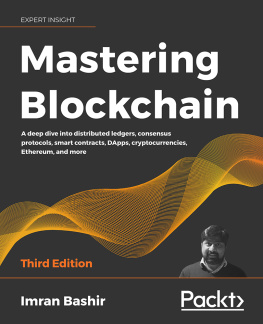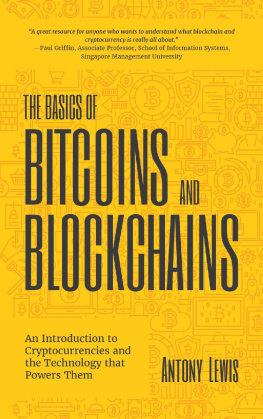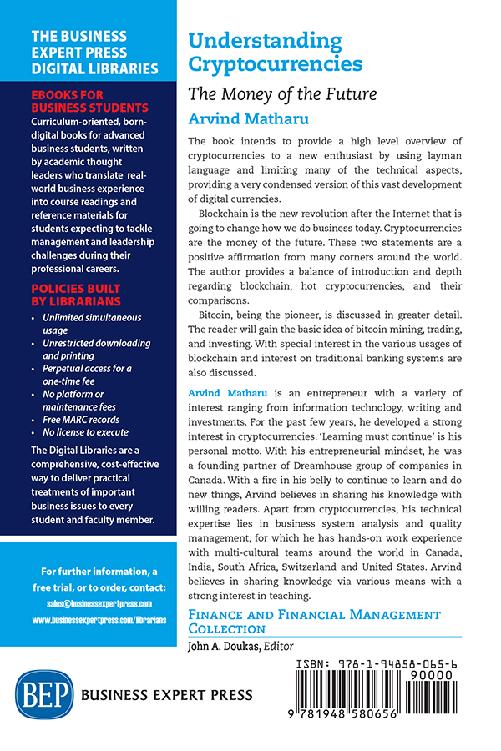
Etheruem.org
Bitcoin.org
Litecoin.com
Businessinsider.com
Investorpedia.com
Many more websites of various cryptocurrencies listed in the book
Arvind Matharu is an entrepreneur with a variety of interest ranging from information technology, writing and investments. For the past few years, he developed a strong interest in cryptocurrencies. Learning must continue is his personal motto. With his entrepreneurial mindset, he was a founding partner of Dreamhouse group of companies in Canada. With a fire in his belly to continue to learn and do new things, Arvind believes in sharing his knowledge with willing readers. Apart from cryptocurrencies, his technical expertise lies in business system analysis and quality management, for which he has hands-on work experience with multi-cultural teams around the world in Canada, India, South Africa, Switzerland and United States. Arvind believes in sharing knowledge via various means with a strong interest in teaching.
OTHER TITLES IN OUR FINANCE AND FINANCIAL MANAGEMENT COLLECTION
John A. Doukas, Old Dominion University, Editor
Escape from the Central Bank Trap: How to Escape From the $20 Trillion Monetary Expansion Unharmed by Daniel Lacalle
Tips & Tricks for Excel-Based Financial Modeling: A Must for Engineers & Financial Analysts, Volume I by M. A. Mian
Tips & Tricks for Excel-Based Financial Modeling: A Must for Engineers & Financial Analysts, Volume II by M. A. Mian
The Anti-Bubbles: Opportunities Heading into Lehman Squared and Golds Perfect Storm by Diego Parrilla
Risk and Win!: A Simple Guide to Managing Risks in Small and Medium-Sized Organizations by John Harvey Murray
Essentials of Enterprise Risk Management: Practical Concepts of ERM for General Managers by Rick Nason and Leslie Fleming
Frontiers of Risk Management: Key Issues and Solutions, Volume I by Dennis Cox
Frontiers of Risk Management: Key Issues and Solutions, Volume II by Dennis Cox
Announcing the Business Expert Press Digital Library
Concise e-books business students need for classroom and research
This book can also be purchased in an e-book collection by your library as
a one-time purchase,
that is owned forever,
allows for simultaneous readers,
has no restrictions on printing, and
can be downloaded as PDFs from within the library community.
Our digital library collections are a great solution to beat the rising cost of textbooks. E-books can be loaded into their course management systems or onto students e-book readers.
The Business Expert Press digital libraries are very affordable, with no obligation to buy in future years. For more information, please visit www.businessexpertpress.com/librarians.
To set up a trial in the United States, please email
What Is Cryptocurrency?
Cryptocurrency is the money of the future. In the current digital era, digital money was already overdue, which makes the arrival of cryptocurrency during the past 9 years as no surprise. Cryptocurrency is a digital or virtual currency that is still in its embryonic stage and has been gaining lots of attention worldwide. It has not replaced the government-issued money yet due to various factors inherent to it. However, the technological advances are filling the gaps and overcoming the current obstacles slowly and steadily.
Remember when the plastic money, that is, credit cards were introduced? Everyone would have thought that time that how a plastic card may be used instead of paper currency. And today, it is unimaginable for a common person to be without credit cards. The initial resistance was overcome by taking care of challenges related to plastic money. On that note, the day is not far when cryptocurrency may remove the need of banks.
The reasons for the attention gained by cryptocurrencies during the past 10 years are multifold. First, it does not exist in a tangible or physical form. It is not a government-issued currency printable on paper. Cryptography is used to ensure its attributes to be used as a currency by which a cryptocurrency can be used as a medium of exchange and perform monetary transactions, in the same way as the printable bills can be used. Cryptography is the science by which intelligible data or information can be scrambled or concealed by using encryption techniques. Encryption is done from the sender side to make the intelligible data into an unintelligible one. Whereas, on the receiver side, the decryption takes place to bring the encrypted data back into an intelligible form again. The processes of encryption and decryption take place via an algorithm. An algorithm stands for a set of instructions in the world of computing. These instructions in a computer programming language perform a specific task.
Cryptocompare.com depicts the process of cryptography in the following diagram:

Cryptocurrency derives its name from two words, namely, cryptography and currency; a digital currency controlled by cryptography. A cryptocurrency has no inherent value; however, its value comes from the peoples belief in it.
Definitions and Attributes of Cryptocurrency
The Merriam-Webster dictionary defines cryptocurrency as follows:
any form of currency that only exists digitally, that usually has no central issuing or regulating authority but instead uses a decentralized system to record transactions and manage the issuance of new units, and that relies on cryptography to prevent counterfeiting and fraudulent transactions.
The definition from online Oxford dictionary is as follows:
A digital currency in which encryption techniques are used to regulate the generation of units of currency and verify the transfer of funds, operating independently of a central bank.
From these two definitions, the following conclusions can be drawn:
Cryptography manages the cryptocurrency by using encryption and decryption techniques.
Cryptocurrency is a digital asset that can be used in place of a printable currency toward monetary transactions.
There is no central issuing or regulating authority.
A decentralized method is used to verify, record, and monitor all the transactions.
The decentralized system manages the issuance of new units; those are generally limited in number by the governing algorithm.
Considering cryptocurrency has no central or regulating authority; its value is defined by consensus from people believing in it. It is a borderless currency with which international payments can be made cheaper than conventional currencies. A conventional currency such as a U.S. dollar is governed by a central bank that defines its value represented by printable bills, coins, drafts, cheques, or other similar banking instruments. The value of cryptocurrency comes from an encrypted code that is difficult to reproduce, making it scarce and limiting its numbers, unless the creator of cryptocurrency decides to change the underlying algorithm to create more units. Being a bank-free or border-free currency, cryptocurrency offers an alternative to conventional currencies.
The basic unit of a cryptocurrency is called a coin that is an encrypted code consisting of a string of characters. A coin is merely an entry in a database available publicly via a blockchain that can be called as a distributed ledger.
A blockchain validates the coins of cryptocurrency. A blockchain is certainly a revolution that is here how we are going to see the world in the coming decades. The blockchain is already in the process of making its place as something much bigger than the Internet itself.
Next page
![Arvind Matharu [Arvind Matharu] Understanding Cryptocurrencies](/uploads/posts/book/119680/thumbs/arvind-matharu-arvind-matharu-understanding.jpg)
